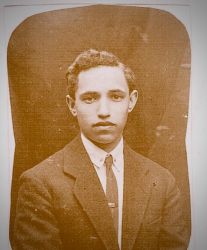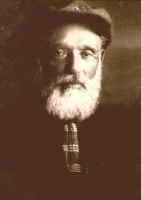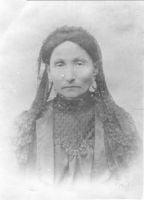
ASIMOV, Daughter1 of Ephraim
1. ASIMOV, Daughter1 of Ephraim was born about 1926 (daughter of ASIMOV, Ephraim (Afoim) (Avram) and KHALDEI, Rose); died about 1942 in Nazi gas chamber. Other Events and Attributes:
- Cause of Death: Gas chambers in Maykop
2.  ASIMOV, Ephraim (Afoim) (Avram) was born in 1907 in Russia (son of ASIMOV, Aaron Menachem and LEIKIN, Hanna); died about 1943 in Missing in action.
ASIMOV, Ephraim (Afoim) (Avram) was born in 1907 in Russia (son of ASIMOV, Aaron Menachem and LEIKIN, Hanna); died about 1943 in Missing in action. Other Events and Attributes:
- Education: graduated from Technology Institute in Leningrad, chem major
- Occupation: Chemist
- Cause of Death: Gas chambers in Maykop
Notes:
Graduate of the Technical Institute in Leningrad.
Fought in WWII
"Was quite successful in his work," wrote his niece, Serafima Asimova, in her letter to Isaac Asimov from Leningrad in 1979. "My father tried to get any news about him (after he disappeared during the war) but he did not manage."
In her 2006 email, Serafima wrote that Ephraim "played on a violin, a balalaika, a guitar, without notes, on hearing. As well as many young people, he has left to study for Borovichi. There he has arrived in "rabfak" where accepted workers...Afroim has perfectly well finished "rabfak" (college) and has left for Leningrad. A has acted and has finished perfectly well Leningrad an institute of chemistry & technology. He dealt with a problem of research and introduction of artificial rubber. By this time he has already been married. His wife called the Rose, (she was from Petrovitchi) at them was two children.
"On scientific development Afroim should receive a degree of the doctor, but it was 1939-1940 Year He has received a direction in the city of Maikop and has left there with the family. My father was going to go to us to holiday, but war begery quickly to Caucasus there came fascists. All family was lost in gas chambers about what to my father employees of a factory informed In many years in Petersburg State University of Chemistry and Technology institute I have redeemed the private affair of student Asimov. I shall scan it and I shall send."
Serafima wrote on Facebook that “Afroim, his wife Rose Khaldei together with children died during the occupation in the gas chambers in Maykop.”Ephraim married KHALDEI, Rose about 1925 in Petrovichi, Russia. Rose was born about 1900; died in Nazi gas chamberP. [Group Sheet] [Family Chart]
3. KHALDEI, Rose was born about 1900; died in Nazi gas chamberP. Other Events and Attributes:
- Residence: Maykop, Russia, USSF
- Cause of Death: Gas chambers in Maykop
Children:
- 1. ASIMOV, Daughter1 of Ephraim was born about 1926; died about 1942 in Nazi gas chamber.
- ASIMOV, Daughter2 of Ephraim was born about 1928; died about 1942 in Nazi gas chamber.
Generation: 3
4.  ASIMOV, Aaron Menachem was born about 1865 in Petrovichi, Smolensk, Russia (son of ASIMOV, Mendel and UNKNOWN, Wife); died in 1939 in Russian hospital, St. Petersburg.
ASIMOV, Aaron Menachem was born about 1865 in Petrovichi, Smolensk, Russia (son of ASIMOV, Mendel and UNKNOWN, Wife); died in 1939 in Russian hospital, St. Petersburg. Other Events and Attributes:
- Occupation: Dealer in grain: rye, oats, barley, buckwheat. In the family mill they prepared it to be cooked and eaten.
- Occupation: Dealer in raw linen:“penka,” “len,” and “poskany.” Able to sort out the linen by grade and quality.
- Religion: Jewish
- Residence: Petrovich, Russia
Notes:
In 1979, Serafima Asimova wrote to her cousin, Isaac Asimov, from Leningrad, and said that her Grandfather Aaron Asimov and Grandmother Hana Leikin Asimov had six children: Judah, Rachel, Dvosja, Boris, Ephraim and her father, Samuel.
Judah (1896 -1969) wrote a recollection of years in Russia and said that Aaron Asimov had been a grain dealer who sold rye, oats, barley and buckwheat.
Judah wrote that his father was a great believer in G-d.
He wrote that Aaron did not hit his children--except once. Judah was about 18 when he and his father asked the local rabbi to rule in a business dispute between them and another man whom they believed had deceived them. When the Rabbi ruled against Aaron and Judah, Judah objected. Aaron slapped Jack, saying that the decision was the Rabbi's to make and that they would abide by it.
Aaron was smart. When a new tax collector came to town, it was Aaron who noticed that the townspeople weren't being given receipts for the money they paid. Instead, the tax collector had them sign a paper after they paid. So Aaron asked for a receipt. The tax collector refused, so Aaron said he would neither pay nor sign.
It turned out that the paper everyone was signing was a lease that turned over their property to the tax collector and permitted him to raise their rent at will. So Aaron and the other townspeople took the tax collector to court in a case that went up to the Russian Duma. No one knows how the judge would have decided, however, because the year was 1917, and the Russian Revolution turned everything upside down.
Here is an excerpt from a 2006 email from Serafima Asimova, the daughter of Aaron's youngest son, Samuel, referring to the aftermath of the Russian Revolution in the 1920s:
"By then, it is the middle of 20 years [1920s], family of grandfather Aaron have deprived with all earned, mills, have forced to go to work ( hi there were 70 years) in collective farm."
Serafima also wrote that Aaron went to live in Leningrad with his son, Boris, in later years, and died in a hospital after an operation.
Died:
In an email much later, 2019, Serafima says Aron died in 1937Aaron married LEIKIN, Hanna about 1893 in Petrovichi, Russia. Hanna (daughter of LEIKIN, Husband and UNKNOWN, Ziva) was born about 1870 in Hislavichi near Petrovichi, Russia; died about 1936 in Petrovichi, Russia. [Group Sheet] [Family Chart]
5. LEIKIN, Hanna was born about 1870 in Hislavichi near Petrovichi, Russia (daughter of LEIKIN, Husband and UNKNOWN, Ziva); died about 1936 in Petrovichi, Russia. Notes:
In his written recollections, Hana's son, Judah "Jack" Asimov (1896-1969) writes that his mother (whom he doesn't name) was the eldest of 8, with 2 sisters and 5 brothers.
Here is what Judah Asimov wrote:
"The eight children were all very smart people."
"The oldest brother was NOCHUM JACOB." (clever. grew a cucumber inside a bottle, then cut off the stem. Surprised the neighbors).
"Another brother was SCHMEREL." (ordained to be a rabbi, but preferred to be a businessman.)
"Another brother was ELIE." (great scholar. Had a Russian high school diploma -- a tough course of study. From 1912-14, he was a salesman for a coal mining co, and a newspaper correspondent in the city of Bachmut which has a new name now. )
Judah writes that his mother was well versed in Jewish ritual and prayed all the time with other women who didn't know how as much as she did. She was also very generous, and known for giving more food to beggars than the typical slice of bread or half kopek. She also gave yogurt, cheese and a piece of "shave" or herring. The family also had a couple of cows.
Judah also writes:
"I traveled to CHISLAVITCHI. That is the town where my mother’s mother and her brother lived..."
Irina Leikin, who is descended from Moshe Leikin (a brother of Hana?), also said the Leikins were from Hislavitchi.
Hana's granddaughter, Serafima Asimov, the daughter of Hana's son Samuel, writes in a 2006 email that "Anna Leikin [wife of Isaac Leikin] who came, too, either from Petrovitch or from Hislavitch.”
Serafima also wrote in that email: "My grandmother Hanna who…was very beautiful - was never photographed."
And in a 2016 email: “She was very beautiful, blue-eyed little woman. She had never been photographed. Children of (her were) loved and treasured. Hana Leikin explains when another's people kiss and father mother - scolds - is unequally. I this know on the memories of my dad Samuel Asimov. It is necessary to somehow write everything .... Time flies very quickly ….”
Here is what Judah wrote about his mother:
"My Father & Mother
To talk about my father (ZL), I must start with my mother.
She came from a family in which her mother counted more than her father, who was a very simple man but also very honest and pious. My grandmother, his wife, lived to a great old age. I believe she passed the hundred mark. She had 8 children. My mother was the oldest, and she had two sisters and five brothers.
They where all very smart people. For example, when the oldest of the brothers, Nochum Jacob, was about 11 years old, he made a little box and polished it and painted it. Inside, he fit a quart bottle and took it to their garden where they grew all kinds of vegetables for their use. He took a bud from a cucumber, placed it inside the bottle, and watched it grow. When he decided it was big enough, he cut the stem off, leaving that cucumber inside the bottle. He then filled it with preserves to make it last, and startled the neighborhood. How did he put such a cucumber inside such a small hole?
This was an example of how all of them were smart people. But my motherís brother Schmerel had (SMICHO OF HEIROO), which means he was ordained to be a rabbi but he preferred to be a businessman.
Her brother Elie, besides being a great scholar in Talmud, also had a Russian high school diploma. That was more education than at an American high school. From 1912 to 1914, he was a salesman for a coal mining company and a correspondent with a paper in the city of Bachmut, which now has a new name that I donít know.
That is the family my mother descended from. My mother was well versed in Jewish ritual. She used to pray all kind of prayers with other women who did not know how. In her charities, she was the most outstanding woman. In my time, there were poor Jews who used to go from town to town begging. The usual donation was half a kopek or a piece of bread. But my mother did not give the usual. All the beggars knew that. They used to come to her not when they were in the neighborhood but when they felt hungry. And my mother used to feed them with what you would call here yogurt, and cheese.
To make all of her preparations, we used to have our own two cows. Of course, sometimes she would give a plate of ìschave,î or a piece of herring. But she always fed everybody who came to here door. Besides, my father (ZL) used to bring an ìoirech,î a guest, for Saturday for three meals.
I remember once a preacher came to our town and my father (ZL) liked his preaching, so he invited him to come for Pesach [Passover]. But usually before Pesach the snow started melting, so he told the preacher to come two weeks before. And two weeks after Pesach, it was impossible to leave. So we had him for five weeks living with us in our house.
One more thing happened, while I am telling how my mother was charitable. A preacher came to our town, and for the first time in my 10 or 11 years, I saw a preacher, dressed in a white shirt with a tie and good clothes, who wouldnít sting unless somebody guaranteed 15 rubles, an unheard of sum of money at that time. But his name meant something to my father (ZL), and he guaranteed the sum of money. But when he went collecting, the townspeople did not want to give more for this preacher than for any other one. My mother thought over the situation and told my father (zl) to pay the full sum himself because she said the people would think now that if they gave, they would be giving for [my father]. The people had no obligation, and she said we would somehow get along if we paid out that much money ourselves and we would no longer ask for anything from anybody else. There were many times when she could have spent the charity money she divided for her own needs. But to her, a kopec was never better spent than for charity."Children:
- ASIMOV, Girl was born in 1894 in Petrovichi, Russia; died in 1894 in Petrovichi, Russia.
- ASIMOV, Judah was born on 21 Dec 1896 in Petrovichi, Russia, 53.58 deg N lat; 32.10 E long.; died on 4 Aug 1969 in Miami Beach, Florida, USA; was buried in Mt. Golda Cemetery, Huntington, Long Island.
- ASIMOV, Rachel was born about 1900 in Petrovichi, Russia; died about 1939 in Russia.
- ASIMOV, Dvosja was born about 1901 in Russia; died in 1977 in Leningrad.
- ASIMOV, Abraham Ber (Boris) was born in 1902 in Petrovichi, Russia; died on 30 Aug 1986 in Hadera, Israel; was buried in Netanya Cemetery on Shikun Vatikim Street, Israel.
- 2. ASIMOV, Ephraim (Afoim) (Avram) was born in 1907 in Russia; died about 1943 in Missing in action.
- ASIMOV, Boy was born in 1904 in Petrovichi, Russia; died about 1904 in Petrovichi, Russia.
- ASIMOV, Samuel Aronovich was born on 7 Nov 1909 in Petrovichi, Russia; died in 1963 in Leningrad, USSR.
Generation: 4
8. ASIMOV, Mendel was born about 1850 in Petrovichi, Russia (son of ASIMOV, Abraham Ber and SHEPSHELEVA, Sosya); died in 1916 in Russia. Notes:
Mendel was the youngest of 12 children of Abraham Ber and his first wife, and the only one of his siblings to survive infancy, according to the written recollections of his grandson, Judah (Jack) Asimov, 1896-1969.
In his recollections, Judah writes that although Mendel was "not a scholar," neither was he ignorant of Jewish reading and prayer -- only of the Talmud. Yet he was clever, and was elected several times to the "Society of Psalm of David Sayers." He also was in the Chevro-Kadisho, a volunteer group that took care of holy burials. Mendel's decision would prevail if there were disagreements in burial location, as there often were.Mendel married UNKNOWN, Wife. Wife was born about 1850 in Russia. [Group Sheet] [Family Chart]
9. UNKNOWN, Wife was born about 1850 in Russia. Children:
- 4. ASIMOV, Aaron Menachem was born about 1865 in Petrovichi, Smolensk, Russia; died in 1939 in Russian hospital, St. Petersburg.
- ASIMOV, Vele was born about 1875 in Russia; died about 1944 in Russia.
- ASIMOV, Hepschel
- ASIMOV, Unknown
10. LEIKIN, Husband was born about 1850 in Russia; died in Russia. Husband married UNKNOWN, Ziva about 1875. Ziva (daughter of UNKNOWN, Unknown) was born about 1850 in Tatarinovo; died about 1950. [Group Sheet] [Family Chart]
11.  UNKNOWN, Ziva was born about 1850 in Tatarinovo (daughter of UNKNOWN, Unknown); died about 1950.
UNKNOWN, Ziva was born about 1850 in Tatarinovo (daughter of UNKNOWN, Unknown); died about 1950. Other Events and Attributes:
- Residence: CHISLAVITCHI
Notes:
Her marrying into the Leikin family comes from Irina Leikin, who has said she is related to Grandpa Jack's mother's family (Anna Chaya).
At the same time, Grandpa Jack (Judah, 1896-1969), wrote that his mother's mother (he didn't name her), "counted more" than his mother's father, "who was a very simple man but a very honest and pious" man.
Grandpa Jack wrote that his mother's mother "lived to a great old age, I believe she passed the hundred mark."
Grandpa Jack wrote that his mother was the eldest child. She had two sisters and five brothers "and they were all very smart people."Children:
- 5. LEIKIN, Hanna was born about 1870 in Hislavichi near Petrovichi, Russia; died about 1936 in Petrovichi, Russia.
- LEIKIN, Ronja was born in 1881 in Hislavichi near Petrovichi, Russia; died in 1966.
- LEIKIN, Hasja was born in 1878 in Hislavichi near Petrovichi, Russia; died in 1955.
- LEIKIN, Nochum Jacob was born about 1879 in Hislavichi; died in killed by germans (serafima).
- LEIKIN, Elijah (Elie) was born about 1880 in Hislavichi.
- LEIKIN, Moshe was born about 1881 in Hislavichi near Petrovichi, Russia.
- LEIKIN, Schmerel was born about 1882 in Hislavichi.
- LEIKIN, Unknown was born about 1883 in Hislavichi.
This site powered by The Next Generation of Genealogy Sitebuilding v. 14.0.3, written by Darrin Lythgoe © 2001-2024.
Maintained by Hugh Byrne. | Data Protection Policy.
